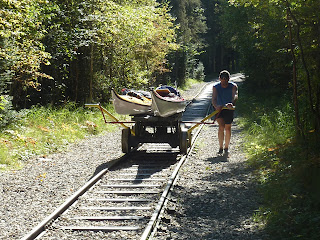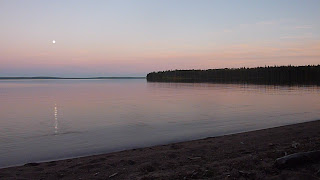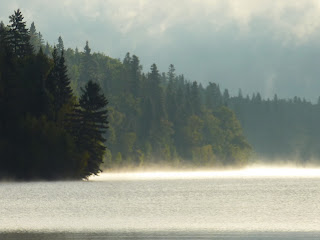A day out with Niall
I left the north coast of Scotland
on the Friday evening as I had done on many occasions and headed down to Jim’s.
There were only a handful of climbers who could claim to head south for a
weekend’s climbing in the Scottish mountains and I was one of them. It took
about an hour to get down the Strath Halladale road, take the short cut up over
Glen Loth (if the road was open) and then another hour to Inverness on the A9.
Jim Hall was a career climber.
This isn’t saying he made his living at it, but that this is what he did, this
is what defined him, that climbing was what he identified with. He had made his
living as a nuclear engineer and I had met him while he was working in
Dounreay. Together we had opened up some of the best sea cliff climbing on the
far north coast of Scotland (which largely remains unrepeated).
Jim lived in Newtonmore. In typical
Jim Hall style, he had selected his home town, not for its amenities or its
wonderful setting but because it sat right in the middle of the Highlands, thus
affording him the choice of going east or west with equal ease depending on the
BBC weather forecast at 9.30pm on the night before. As any experienced Scottish
winter climber knows, never make your destination decision until the last
minute.
We weren’t close friends. Not in
the accepted definition of the term. We spent a remarkable amount of time together,
we climbed well together, but I’m not sure that we really liked each other. It
was one of those odd relationships you often find in climbing. Two people
brought together by a common interest, a common passion, but where individual
personalities limited the bond. I don’t doubt it was as much me as it was Jim
and I hope no one thinks that we didn’t get along, it’s just that we had a time
limit together beyond which we needed our own space. Essentially, we wound each
other up.
I had met Ally (Alistair) in the
Torino hut on the French Italian border a few years earlier. I was climbing
with an ex-army friend called Warren and Ally was with a lad whose name now
escapes me. This is where my memory gets a little fuzzy. I think on this
occasion, myself and Warren had just done the Pyramid du Tacul and Ally and his
mate were going for the Rochefort arête but it could have been the time when
myself and Warren did the full traverse onto the Tour Ronde. Or perhaps we had
done both? In any case, I think they noticed us because of the smell. Warren and
I had been bivvying out on the glacier for a couple of nights and so we were a
bit ripe. Despite this minor social problem we all agreed to rope up the next
day to walk back across the Vallee Blanche in a snow storm. I can’t remember if
the cable cars weren’t running or if it was just pig headedness but it was an
interesting trek back in low visibility. Warren was in the lead and went
through a crevasse once due to us cutting across towards the midi station too
soon. You need to keep left for quite a long way once you get up onto the Valee
Blanche from the Glacier du Geant but with low visibility and no tracks to
follow it was an easy error to make. In any case we all made it back and a bond
was formed.
The following year we linked up
together and drove down to Cham in Ally’s Citroen Picasso. This time Ally was accompanied
by Mark. Both Ali and Mark were fell runners and two of the fittest blokes I’ve
ever met. We stayed in the Torino hut again and I think we attempted the Dent
du Geant but got turned back by bad weather. This time Warren and I decided to
take the cable car back. We had a bit of a wait and so Ali and Mark decided to
see if they could beat us back on foot. They didn’t manage to but it was very
close. I think they did the Torino to the midi station in an hour and a half!
Within 2yrs Mark was no longer with us, taken by cancer, a really sad loss.
Now, Alistair had a girlfriend,
Allison (Yes, that’s right, Ally and Ali). He had decided to take her climbing
in Scotland and we agreed to meet up on the Sunday of the weekend in question
to do some routes on the Ben. We were aiming to form a rope of three as Allison
had limited winter experience.
So when I got to Jim’s I told him
I was only up for one day as I was heading over to the Ben for Sunday. He was
good with this and we planned a trip into the Loch Avon basin to look at Hell’s
Lum on the Saturday. For some reason we decided to cross country ski over the
plateau and this might have been a good idea had we had the proper gear but I
might have forgotten to mention just how tight Jim was.
So there we were on Saturday
morning, climbing up the goat track, each with a pair of 1920’s cross country
skis strapped to the sides of our packs and a pair of Max Wall ski boots inside
the packs which Jim had picked up in a car boot sale for about a fiver. Up on
the plateau there wasn’t enough snow to link together 100 yds and even if there
was the things on our backs would have been more hindrance than help so they
never came off the packs. Then when we walked down to Hell’s Lum the whole
thing was so out of condition that we simply kept going on past, came out of
the basin and returned to the car park.
TBH, I was ok with this. It was a
great day out even if we didn’t get anything done (and had carried a set of old
skis around just for fun) and I was off to the Ben the next day for some easy
climbing with Ally and Ali. Winter climbing can be quite stressful so the
thought of an easy and enjoyable weekend had its appeal and I was now mentally set
for cruise mode.
So I left Jim’s at about 4.30am
on the Sunday morning and headed over to the Ben car park to meet up with Ally
and Ali. I think they dossed down in the
car and I met up with them as planned and on time and after the usual sorting
of gear, shit in the woods (Christ on a bike I wish someone would put a bog in
that car park – perhaps they have now?) and a quick cup of coffee we set off.
We were good and early and there
weren’t too many ahead of us. We made steady progress up the track, past the
guide’s car park and on towards the CIC hut. The dawn was just breaking and we
were in that half light where you could make out most things but the detail was
lacking.
For some reason Ally decided to
cross the burn early, well before the hut and in the half light he didn’t
notice the glaze of ice formed over the rocks. About half way across he slipped
and fell and even I heard the crack and I knew then and there it wasn’t going
to be good. By the time I got to him his wrist was already swollen and even a
blind man could tell it was broken. Shit, what to do? Clearly Ally had to go
back down to hospital and Ali was going with him. She would need help to get
him down as he could walk ok but was in pain and would need to take it slow.
So we rigged up a sling and back
down we went, meeting party after party of climbers on their way up who gave us
odd looks of “why ya going down?” And
me, I’d just switched off by now, decided it wasn’t to be and was happily
chilled at the prospect of an early bath.
Now Ally is a sociable character
who makes friends easily and as we descended the track we bumped into a party
of lads who he had met in a cafe the evening before and who he’d struck up a
conversation with. After the initial enquiry and explanation of events Ally
pointed out that it was a shame for me as I now had to miss out on a day’s
climbing. Me, I’d already switched off and was ready for a pint (ok, maybe a
little early) and the drive back up north so, while I appreciated Ally’s
concern, I was good. So then one of the lads said that they were a party of
three and I could hook up with one of them and that it would work out all
round. One of their group was a novice and if I could take him that would be
great. Now I could see my easy day on the hill turn into a bit of a ball
breaker so I happily pointed out that I hadn’t brought any gear. Yes I had my
harness, axes and crampons but as I was going to make up a rope of three,
essentially following Ally up the climbs, I hadn’t brought any of my own ice
screws etc. I was carrying Ally’s rope and a few nuts but that was it. So then
Ally handed over the rest of his gear and Ali handed over what she was carrying
and there I was faced with the prospect of turning round, going back onto the
Ben, with someone else’s gear and with a novice partner I didn’t know from
Adam.
The lad’s name was Niall and as I
looked a little closer I realised it was Niall Grimes. Shit. What could I say?
So I said “Hi Niall, I’m Bob, what do you fancy climbing?” and he said “point
5” and I thought “you can fuck that, mate, the queue will be four parties deep
by now, I have you as a winter novice, I have someone else’s rope and gear and
frankly I don’t feel much like committing suicide” So I said “Hmmm, perhaps we
should try something a little more straightforward” and we headed off to do
Comb Gully.
When we got there we moved up to
a stance just below the rocky outcrop and waited for a party to move off before
I moved up and set up a belay. Can I just say now how much I love climbing with
other people’s gear and a new partner who I don’t know? It’s the ease with which you can find
everything, how you know how everything fits together and how it all falls into
place......or perhaps not. In any case I set Niall off on the first pitch and
to be fair he flew up it, like he was a natural. I think he might have strung
together two pitches because when he did bring me up I was facing the crux
pitch which was fine and I knocked this off, brought Niall up and then he
finished off the climb and we topped out into brilliant sunshine and a
wonderful day on the Ben.
(aside: Right now the whole
fuckin’ world is questioning why I allowed a complete winter novice to set off
leading the first pitch of his first ever winter climb. But the truth is that
it all made sense at the time. Grimer is no slouch at climbing, has the
experience to understand protection and set up belays and was completely up for
the challenge. So who was I to blow against the wind?)
Out on the top a big smile
crossed my face, I began to relax and thought “great, nice easy route, time to
chill and then head back down and home”....... Only Niall had other plans.
“What next” he says.
So we abed back down number 4
gully to see what was available. I had
thought about doing Green Gully but it had a big queue so I opted for number 3
gully buttress. And again I set Niall off first thinking he would breeze the
first pitch which was essentially a snow ramp.
He was out of sight from my belay
and after about an hour of very little progress I was thinking “what the fuck
is he doing?” so I start hollering to check if he was ok and he must have
thought I was a right cock. In any case, when I did eventually get the shout it
turned out that he had chosen the hardest start option which was really the
beginning of another climb the name of which escapes me now. I think it’s a
grade IV or V at least. So fair play to
him, he certainly had balls and some skill to go with them.
Anyway, the next couple of
pitches took us to the stance just before the step across the gap and it was
Niall who had lead this last one so that when I got there I saw he was attached
to a single sling placed over a block and nothing else and he was looking
straight up to where the last party had gone and I said “nope, the true route
goes right, across this step. So I headed across, making the “come to Jesus”
step in an ok style and then hitting the ledge which was fully banked out. The
snow was consolidated but not so’s you could place any protection and as I eased
my way across I prayed that I didn’t take a whipper as I didn’t think Niall’s
sling would hold us both and if it didn’t we would both be making the evening
news. Then Niall called to me to stop ‘cos he wanted to take a photo and I
obliged while secretly shitting myself and then I made it out onto the top and
started to breathe again.
I set up the belay and brought
Niall across and he made the comment that it was a little exposed and we smiled
and sat there for a while and took in the sun. The Ben was buzzing, seemed like
half the world was up there that day and then Al Hinkes walked over and started
chatting to Niall and I was sitting there thinking “this isn’t real”.
So we abed back down number 4
gully and I swear there must have been 100 people moving off the Ben via that
route at that moment but by the time we got to the CIC I think we were the only
ones left. Niall had started to move a little slow and I was in a hurry to get
back to the car park as I had another 3hrs in the car to go. We sat down for a
drink and exchanged any gear we had crossed over. I asked if he would be ok
getting back down on his own and assumed he would catch up with his mates in
the car park. He was fine with this and off I went. By this time it was dark.
Looking back it probably wasn’t a
really great thing to do. But in truth we’d had very little rapport, no real
banter and no real chat. It might have been my mood, it might have been his. As
I said earlier, I’m not an easy person to get on with but I’m pretty sure he
survived ;-)
















